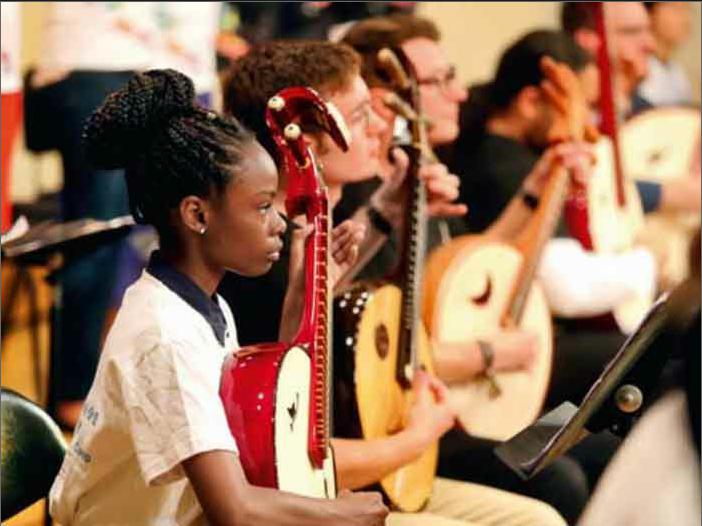Fostering a Follow-up Golden Decade
2017-09-27


China Pictorial (CP): What are the most important achievements of the BRICS cooperation mechanism over the past 10 years?
Jia Jinjing (Jia): The BRICS cooperation mechanism was born in 2006, and BRICS countries have enjoyed a “golden decade” marked by notable results. The total economic output of the five BRICS members—Brazil, Russia, India, China and South Africa—accounts for nearly a fourth of the worlds total, and they have contributed approximately 50 percent of world economic growth. BRICS has gradually evolved into a model for mutuallybeneficial cooperation between emerging markets and developing countries from an original investment concept into concrete results. Today, it plays an important role in promoting world economic growth and improving global governance.
CP: What are the innovations of BRICS compared to other multilateral cooperation mechanisms?
Jia: Over the past 10 years, BRICS has grown from an investment concept on paper to a multi-level and multi-sector cooperation framework featuring meetings between leaders, ministers and senior private-enterprise representatives on security issues and a host of other issues. Over the last few years, BRICS cooperation has maintained the principle of “two-wheel” drive with economics and politics, which has paved new roads for South-South cooperation. Compared to other multilateral cooperation mechanisms, BRICS has innovated its mechanisms in four ways:
First, BRICS swiftly changed member countries role from a participant to a leader in global governance. This is not only the result of BRICS countries strong collective voice in global gover- nance, but also the result of inevitable evolution of global patterns. History shows that BRICS does not impose its will on others—rather, it has fostered a greater output of public products while ensuring independent internal affairs, thus creating a new model worth studying and applying to global governance.
Second, BRICS countries have accumulated rich experience in economic and trade cooperation. The present world economy needs a new round of technological revolution and industrial transformation for growth. During the past 10 years of cooperation, BRICS has impressively explored areas of new economics, e-commerce, trade, investment facilitation, innovation and development, earning valuable experience in the process.
Still, there is huge space to capitalize on complementary advantages between BRICS countries, which are able to promote construction of a big, closely interconnected market characterized by infrastructure connectivity, open trade and investment, and monetary and financial interconnection. This will open new avenues to win-win results in economic growth.endprint
Third, BRICS has promoted people-to-people exchange. BRICS countries are located on several continents, and each has an iconic and profound cultural legacy and different channels of communication with the worlds major cultures. The intensification of comprehensive cultural exchanges among BRICS countries across multiple sectors such as business, academia, media, think tank, and literary and art circles is promoting people-to-people exchanges as it helps construct a community of shared future.
Fourth, BRICS has founded a new type of cooperation mechanism. The five members have established a cooperation mechanism while furthering development in political, economic, and cultural realms, forming a comprehensive cooperation mode different from the G7, which is flat and mostly networking, hence providing a new type of cooperative platform for emerging-market countries and developing countries—which are home to 80 percent of the world population—and allowing developing countries to share the results of development.
CP: In the next 10 years, where do you foresee breakthroughs?
Jia: In the coming decade, BRICS will become a heavyweight participant in global governance and international affairs. To fix the imbalance of the global economy, it is necessary to increase developing countries participation in global governance, enhance the right to discourse and ensure more say in decision-making to build an equal world order together. BRICS cooperation in global governance continues to intensify.
At the BRICS leaders informal meeting in 2016 on the sidelines of the G20 summit in Hangzhou, Chinese President Xi Jinping proposed that BRICS countries work together to improve global governance by increasing representation and the right to speak of emerging markets and developing countries.
At the 2016 BRICS summit in Goa, the group reiterated the G20 Action Plan on the 2030 Agenda for Sustainable Development to promote economic global governance while stressing an anti-terrorism theme and actively designing an international order that is peaceful and stable.
CP: What challenges can the BRICS mechanism help your country face?
Jia: At present, the worlds “long-period economic downturn”hasnt yet bottomed out, as deep-rooted contradictions are continuously exposed. International cooperation mechanisms such as regional economic and trade arrangements, regional groups, the Bretton Woods system and the G20 have navigated the course of the global economy. Today, however, the world is experiencing many new changes economically: Emerging markets and developing countries account for a bigger part of the global economy, and Eurasia has become a major power source for global production and consumption. Establishing new concepts of and blazing new paths for international cooperation have become urgently needed for global development.endprint
Chinas voice in global discourse has become increasingly louder in recent years to respond to these urgent needs. While facing challenges, BRICS countries have also ignited opportunity in new directions for globalization. Internally speaking, BRICS countries are complementary in economy, and, as emerging economies, they are all in a phase of economic growth.
BRICS countries have been reformers of international financial order since the day BRICS was formed. Over the next 10 years, they will lead another round of world economic development and fuel another round of globalization with mechanisms including the BRICS New Development Bank and its “contingency reserve fund.”
CP: How will the BRICS mechanism influence and promote global governance reform?
Jia: Within the G20, the somewhat more inclusive platform for global economic governance, BRICS and the G7 are two of the most important transnational mechanisms. After 10 years of development, the BRICS mechanism has gradually started working alongside the G7 in global governance.
First, BRICS shoulders a heavy task in global governance. BRICS countries account for nearly 40 percent of the worlds population, and they have seen rapid economic development in recent years. In a decade, their total share of the global economy has risen from 12 to 23 percent, contributing more than 50 percent of world economic growth. Because BRICS is the largest driver of the global economy, it needs the greatest “enhancement” of its right to speak and vote in global governance.
Second, BRICS and the G7 share the global governance“stock” responsibility. About 30 years ago, the total economy of the seven major Western countries accounted for about 85 percent of the worlds total, and the G7 became a premier platform for global economic governance.
After the 2008 international financial crisis, those countries have not been able to shake off the dust of low growth, and their proportion of global economic output has dropped to less than 50 percent. Nevertheless, the G7 has always been the pace car for the G20 and BRICS to follow. Therefore, as a more mature mechanism, it shares the same responsibility in global governance as BRICS.
Finally, both BRICS and the G20 share the responsibility of leading global governance. The 2016 G20 summit in Hangzhou, China, was a critical turning point in the history of global governance. All kinds of reports on cooperation in 2017, such as the recent Media Note of the Meeting of the BRICS Ministers of Foreign Affairs/ International Relations, evidence the clear-cut mission of BRICS to share responsibility in G20 policies—a marked difference between the development of BRICS and the G7. The BRICS mechanism is becoming the standard-bearer of the G20s fundamental policies.endprint